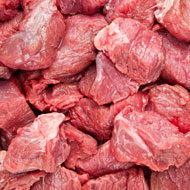mcr-1 gene found in beef sample - FSA

Scientists purchased 314 beef and 310 pork samples from retail premises in England, Scotland, Wales and Northern Ireland.
A beef sample that tested positive for E. coli has been found to contain the mcr-1 gene that confers resistance to the antibiotic colistin.
The Food Standards Agency (FSA) said it is thought to be the first discovery of mcr-1 positive E. coli from retail beef in the UK; but stressed that the risk to public health is very low.
Now in its third year, the EU survey found the levels of antimicrobial resistant (AMR) E. coli in raw UK pork and beef remain consistently low. Scientists purchased 314 beef and 310 pork samples from retail premises in England, Scotland, Wales and Northern Ireland.
Overall, less than one per cent of the samples were positive for ESBL or AmpC E. Coli, which is similar to findings from year one of the survey. However, one beef sample was contaminated with an E. coli containing the mcr-1 gene.
The gene is found on a plasmid, which is naturally able to pass from one bacterial cell to another, allowing AMR to spread more easily. It can also make bacteria resistant to colistin, a ‘last resort’ antibiotic.
Paul Cook, FSA’s head of microbiological risk assessment, said: “This is thought to be the first discovery of an mcr-1 positive E. coli from retail beef in the UK.
“Although the meat came from outside the UK, further testing indicated no contamination with this E.coli on other samples and at this stage we have not been able to pinpoint the source of the contamination.
“However, a risk assessment has been carried out and we want to make it clear that the risk to public health is very low.”



 The Animal and Plant Health Agency (APHA) has updated its online reporting service for dead wild birds.
The Animal and Plant Health Agency (APHA) has updated its online reporting service for dead wild birds.